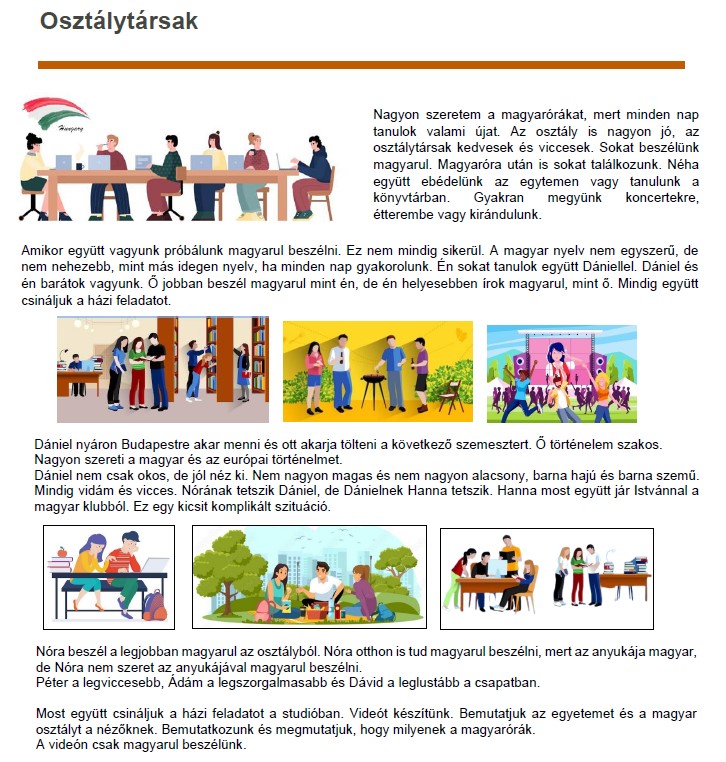Chapter 8 – Part 1 – Osztálytársak

Pronunciation warm up – Consonants
Random words – 2 – vowel and consonant practice
Vocabulary – Practice the pronunciation of the following words
Reading text

Note: nouns, definite verb conjugation -nak, -nek ending (dative), possessive personal endings, helping verbs (tud, akar, szeret+kell, lehet, szabad), adjective -comparative, superlative
Listening
audio/video – TBA
Dictation
Osztálytársak
Reading – Read the text and learn the new vocabulary
Nagyon szeretem a magyarórákat, mert minden nap tanulok valami újat. Az osztály is nagyon jó, az osztálytársak kedvesek és viccesek. Sokat beszélünk magyarul. Magyaróra után is sokat találkozunk. Néha együtt ebédelünk az egytemen vagy tanulunk a könyvtárban. Gyakran megyünk koncertekre, étterembe vagy kirándulunk.
Amikor együtt vagyunk próbálunk magyarul beszélni. Ez nem mindig sikerül. A magyar nyelv nem egyszerű, de nem nehezebb, mint más idegen nyelv, ha minden nap gyakorolunk. Én sokat tanulok együtt Dániellel. Dániel és én barátok vagyunk. Ő jobban beszél magyarul mint én, de én helyesebben írok magyarul, mint ő. Mindig együtt csináljuk a házi feladatot.
Dániel nyáron Budapestre akar menni és ott akarja tölteni a következő szemesztert. Ő történelem szakos. Nagyon szereti a magyar és az európai történelmet.
Dániel nem csak okos, de jól néz ki. Nem nagyon magas és nem nagyon alacsony, barna hajú és barna szemű. Mindig vidám és vicces. Nórának tetszik Dániel, de Dánielnek Hanna tetszik. Hanna most együtt jár Istvánnal a magyar klubból. Ez egy kicsit komplikált szituáció.
Nóra beszél a legjobban magyarul az osztályból. Nóra otthon is tud magyarul beszélni, mert az anyukája magyar, de Nóra nem szeret az anyukájával magyarul beszélni.
Péter a legviccesebb, Ádám a legszorgalmasabb és Dávid a leglustább a csapatban.
Most együtt csináljuk a házi feladatot a studióban. Videót készítünk. Bemutatjuk az egyetemet és a magyar osztályt a nézőknek. Bemutatkozunk és megmutatjuk, hogy milyenek a magyarórák. A videón csak magyarul beszélünk.
Practice exercises
1. True or false
2. Comparative and superlative adjectives
3. Create sentences
4. Find the comparative and superlative form of the adjectives
Grammar Bites
1. ORDINAL NUMBERS “-DIK”
Hányadik? [Which? – by number] – Ordinals are formed by adding -ik to the fractions.
The only exceptions are: első [first], második [second]
2. ORDINAL NUMBERS AND DATE -DIK + -A, E
Dates are expressed by giving the year first, then the month, and finally, the day of the month expressed as the ordinal number with the third person singular possessive suffix. YYYY-MM-DD
Hányadika? – Add -a/e to the ordinal to get the day of the month.
| január 1 | január elseje* |
| augusztus 20 | augusztus huszadika |
3. ORDINAL NUMBERS AND DATE -DIK + -ÁN, ÉN
Hányadikán? – To indicate “on” a certain date, the -án, én endings are added to the date.
| január 1-én | Január elsején van Újév. |
| augusztus 20-án | Augusztus huszadikán van Magyaország születésnapja. |
4. NUMERALS OF MULTIPLICATION
Hányszor? Mennyiszer? [How many times? How often?] – Numerals of multiplication are formed by the formative suffix -szor, -szer, -ször
It can be added to the cardinal numbers and indefinite numbers and pronouns.
| egyszer | kétszer | sokszor | néhányszor |
| once | twice | many times | some times |
Did you know? – Culture Corner
Useful classroom phrases
1. Understand instructions
| Hallgasd meg figyelmesen! | Listen carefully. |
| Olvasd el a mondatot hangosan! | Read this sentence out loud. |
| Van kérdés? | Is there any question? |
| Beszélj hangosabban! | Speak up. |
2. Ask for clarification
| Nem értem. | I don’t understand. |
| Meg tudnád ismételni? | Could you repeat it, please? |
| Van egy kérdésem. | I have a question. |
Hungarian Education – Higher Education
classmates
something
new
(the) class
good
(they) are nice/kind
(they) are funny
we talk/we are talking
we are having lunch
in (the) library
we go/we are going
to concerts
to restaurant
we go on a trip/we are going on a trip
we try/we are trying
succeed
simple (easy)
more difficult
other
foreign language
we practice/we are practicing
better
more correctly/more properly
like/as
we do/we are doing
homework
in summer
(s)he wants
(s)he wants
to spend
next
semester
history
history
(s)he is good looking
tall
brown haired
brown eyed
(s)he likes (a person)
(s)he is dating
from (the) club
complicated
situation
in the best way
from (the) class
at home
to talk
his/her mom
the funniest
most diligent
laziess
in the team
in the studio
we make/we are making
we introduce
to the viewers/audiance
we introduce ourselves
we show
what the Hungarian lessons are like
